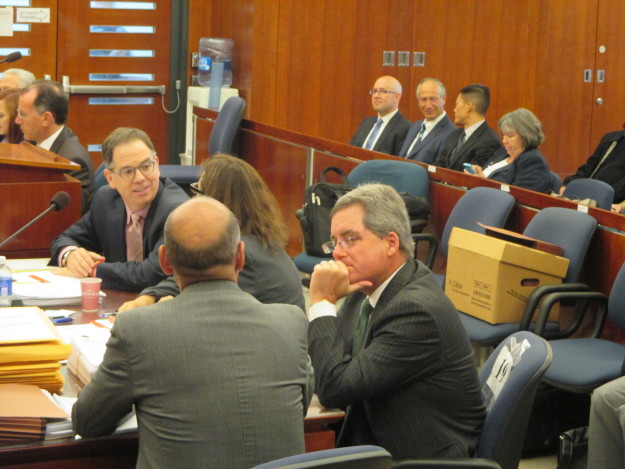
By Tim Redmond
SEPTEMBER 10, 2014 – Judge Curtis Karnow heard arguments today on the immensely complicated flurry of litigation in the City College lawsuit, and while a formal ruling is probably a day or two away, the judge didn’t seem in any mood to derail the city’s case.
City Attorney Dennis Herrera has sued the Accrediting Commission for Junior and Community Colleges, arguing that the agency unfairly yanked accreditation for City College.
Karnow has already issued an injunction preventing the ACCJC from shutting down the school. The case could go to trial this fall.
But the ACJC has asked for summary judgment – in essence arguing that the undisputed facts in the case don’t amount to grounds for the city’s case to move forward. Herrera filed a similar motion, saying that the judge should rule in favor of the city without the need for a trial.
Judges in complicated cases rarely accept summary judgment motions, but the hearing showed the essence of both side’s cases.
The ACCJC lawyer, Andrew Sclar, argued that the city’s case is moot: Herrera filed under the state’s Unfair Practices Act (also known by its code section, 17200), which governs the actions of businesses. The ACCJC, he said, isn’t a business at all; it’s a nonprofit that doesn’t engage in commerce.
Sclar cited a case from Massachusetts where an agency that regulated mortuaries was found not to be a business under that’s state’s unfair practices law.
Karnow was dubious. The agency charges fees, he said, and pays salaries to people who make it their livelihood. As for using a case from Massachusetts – which has no bearing on California law – he said:
“You’re like the person who is looking for his lost car keys under the streetlight. He agrees the keys probably aren’t there, but it’s the only place where there’s enough light to look for them.”
The notion that a nonprofit doesn’t engage in commerce is a bit of a stretch. Sutter Health, which runs California Pacific Medical Center, is a nonprofit created to provide the public benefit of health care. But no sane person would argue that what happens at CPMC is not commerce: Customers (or their insurance companies) pay a fee for treatment; that fee pays the salaries and overhead of the operation.

The ACCJC charges community colleges a fee for its accreditation services. That fee goes for salaries and overhead. Seems pretty simple – and the judge gave no indication that he was going to buy the ACCJC argument and shut the city’s case down.
Sclar also made a stunning claim: Even if the ACCJC had done something wrong, he said, it no longer matters, since the agency has now allowed City College to re-apply for accreditation. The school is open, he said; the conflict-of-interest provisions that were obvious problems in the original accreditation process have been changed. No harm, no foul.
I ran into John Rizzo, president of the College Board, outside the hearing, and he was shaking his head. “It’s incredible,” he said. “We have lost 20 percent of our students, teachers have lost their jobs – and he says there’s no impact of what they did?”
And, of course, as Deputy City Attorney Tom Lakritz noted, the new accreditation process is pretty shaky and allows no appeal.
Lakritz focused on the basics of the case: City College has a right to due process, and it was violated, over and over, by the ACCJC. Some facts that are not in dispute: The ACCJC didn’t follow its own policies. The federal Department of Education says the ACCJC didn’t follow proper procedures. The ACCJC has essentially admitted it screwed up and has since changed its rules.
“The commission amended its bylaws to change has the process works after the DOE said it was a violation of federal rules,” he said. “This is about the integrity of the process,” he said. “We seek an opportunity for City College to get a fair accreditation.”
The way the panel selected members, the fact that the appraisal team violated its own policies (which the commission admitted and changed later), the fact that the visiting team reported that City College had, in fact, completed many of the changes that the ACCJC wanted to see … all of that adds up to an unfair process, Lakritz said.
Karnow didn’t rule on any of this from the bench. If past practices are any indication, he’ll issue a written decision within the next 48 hours or so. My guess is that he won’t even consider the ACCJC’s motion for summary judgment, and will set this for trial.
At which point even more information will come out that will damage the ACCJC’s reputation and push the agency even further toward profound change or extinction.
If the accreditors had any sense, they’d cut their losses: Settle with Herrera, restore CCSF’s accreditation, and live to fight another day. Because I’m not sure the agency will survive a full public trial.






